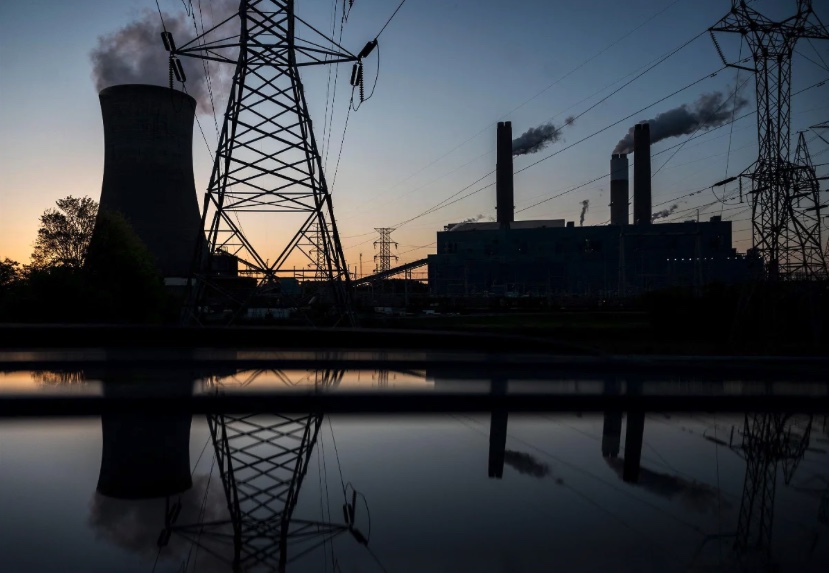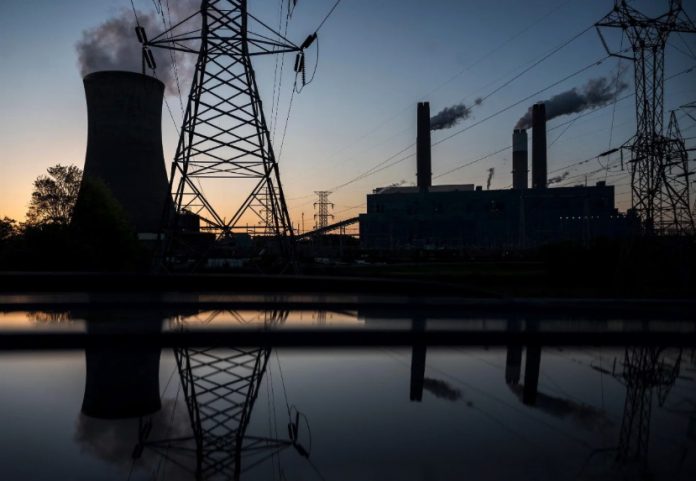ฝ่ายบริหารของ Biden ได้ออกกฎระเบียบสำคัญที่มุ่งเป้าไปที่การปล่อยก๊าซเรือนกระจกของโรงไฟฟ้า โดยมีเป้าหมายเพื่อลดก๊าซเรือนกระจกอย่างมีนัยสำคัญ กฎดังกล่าวกำหนดให้โรงงานถ่านหินและก๊าซธรรมชาติดักจับมลพิษให้ได้ 90% ภายในปี 2575 ควบคู่ไปกับการควบคุมการปล่อยสารปรอทที่เข้มงวดยิ่งขึ้น และการกำจัดของเสียที่ปลอดภัยยิ่งขึ้น การกระทำเมื่อวันพฤหัสบดีเป็นสัญญาณบ่งบอกถึงความพยายามของประธานาธิบดีไบเดนที่จะรักษามรดกด้านสภาพภูมิอากาศของเขา และตัดสินผู้มีสิทธิเลือกตั้งที่ใส่ใจสิ่งแวดล้อม EPA ประมาณการว่ากฎของโรงไฟฟ้าจะป้องกันการปล่อยก๊าซเรือนกระจกได้ 1.4 พันล้านเมตริกตัน หลังจากการคัดค้านของศาลฎีกาในปี 2565 กฎระเบียบใหม่ทำให้เครื่องกำเนิดไฟฟ้ามีความยืดหยุ่นในการปฏิบัติตามมาตรฐานมลพิษ EPA ชะลอการกำหนดกฎการปล่อยก๊าซคาร์บอนสำหรับโรงงานก๊าซที่มีอยู่ ผู้มีส่วนได้ส่วนเสียในอุตสาหกรรม เช่น จิม แมธธีสัน ซีอีโอ ต่างวิพากษ์วิจารณ์ความถูกต้องตามกฎหมายและความเป็นไปได้ของกฎเกณฑ์ดังกล่าว ในขณะที่แพทริค มอร์ริสซีย์ อัยการสูงสุดของรัฐเวสต์เวอร์จิเนีย สาบานว่าจะดำเนินการทางกฎหมาย
Biden ให้ความสำคัญกับการต่อสู้กับการเปลี่ยนแปลงสภาพภูมิอากาศด้วยพระราชบัญญัติลดเงินเฟ้อในปี 2565 ซึ่งเป็นการลงทุนด้านสภาพภูมิอากาศที่ใหญ่ที่สุดในประวัติศาสตร์ของสหรัฐอเมริกา กฎใหม่ของ EPA เสนอสิ่งจูงใจทางการเงินและมาตรการด้านกฎระเบียบ แม้ว่าจะเข้มงวดน้อยกว่าแผนพลังงานสะอาดในยุคโอบามา โดยมุ่งเน้นไปที่เทคโนโลยีการดักจับและกักเก็บคาร์บอน มีการพิจารณาหลายทางเลือก รวมถึงการใช้เชื้อเพลิงที่สะอาดกว่า เช่น ไฮโดรเจนในโรงงานก๊าซธรรมชาติแห่งใหม่ อย่างไรก็ตาม ความกังวลเกี่ยวกับความพร้อมทางเทคโนโลยีทำให้เกิดการถอนข้อเสนอ บริษัทต่างๆ อาจเลือกที่จะเลิกใช้โรงงานเชื้อเพลิงฟอสซิลและเปลี่ยนมาใช้พลังงานหมุนเวียน
EPA ได้สรุปมาตรฐานที่เข้มงวดในการลดการปล่อยสารปรอทและฝุ่นละอองจากโรงไฟฟ้าถ่านหินได้มากถึง 70% ปรอท ซึ่งเป็นสารพิษต่อระบบประสาทที่มีศักยภาพ ก่อให้เกิดความเสี่ยงต่อสุขภาพจากการสูดดมและการปนเปื้อนในสิ่งแวดล้อม ขณะนี้โรงไฟฟ้าจะติดตั้งระบบตรวจสอบการปล่อยสารปรอท สารหนู โครเมียม โคบอลต์ และนิกเกิลอย่างต่อเนื่อง กฎของ EPA ยังควบคุมน้ำเสียสามประเภทจากโรงไฟฟ้าถ่านหินและจัดการกับน้ำที่เก็บไว้ในบ่อเถ้าถ่านหิน ซึ่งช่วยลดมลพิษได้อย่างมาก นอกจากนี้ยังปิดช่องโหว่ในการกำจัดขี้เถ้าถ่านหินที่เป็นพิษอีกด้วย
Biden administration enacts significant climate rules for power plants.

The Biden administration enacted crucial regulations targeting power plant emissions, aiming to cut greenhouse gases significantly. The rules mandate coal and natural gas plants to capture 90% of their pollution by 2032, alongside stricter mercury emission controls and safer waste disposal. Thursday’s actions signal President Biden’s push to secure his climate legacy and court environmentally conscious voters. The EPA estimates the power plant rules will prevent 1.4 billion metric tons of emissions. After a Supreme Court challenge in 2022, new regulations provide power generators flexibility in meeting pollution standards. The EPA delayed its carbon emissions rule-making for existing gas plants. Industry stakeholders, like CEO Jim Matheson, criticised the legality and feasibility of the rules, while West Virginia attorney general Patrick Morrisey vowed legal action.
Biden prioritised combating climate change with the Inflation Reduction Act in 2022, the largest climate investment in U.S. history. The EPA’s new rules offer financial incentives and regulatory measures, though less stringent than the Obama-era Clean Power Plan, focusing on carbon capture and storage technology. Several options are considered, including using cleaner fuels like hydrogen in new natural gas plants. However, concerns about technology readiness led to the withdrawal of a proposal. Companies may also opt to retire fossil fuel plants and shift to renewables.
The EPA finalised stringent standards to reduce mercury and particulate matter emissions from coal-fired power plants by up to 70%. Mercury, a potent neurotoxin, poses health risks through inhalation and environmental contamination. Power plants will now install continuous monitoring systems for emissions of mercury, arsenic, chromium, cobalt, and nickel. The EPA’s rules also regulate three types of wastewater from coal-fired plants and address water stored in coal ash ponds, significantly reducing pollution. Additionally, loopholes for toxic coal ash disposal are closed.
By CNN NEWS

















